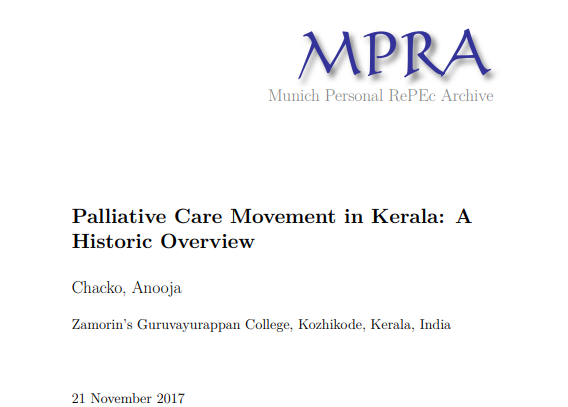Quality of Life of People Living with Cancer Under Institutionalized Palliative Care and Community Based Palliative Care in Kerala
The study adopted a comparative and descriptive research design and utilized WHO’s Quality of Life (WHOQOL) Assessment scale for data collection. The sample consisted of 100 respondents, with 50 patients each from IPC and CBPC settings. Statistical analysis was conducted using SPSS software, with a T-test applied to measure the significance of differences between the groups. The results indicated a significantly higher QoL among CBPC patients in Malappuram compared to IPC patients in Thiruvananthapuram. The CBPC model, which involves active participation of community volunteers, demonstrated superior outcomes in addressing physical, psychological, and social challenges faced by cancer patients.
The research findings reveal that patients under CBPC experienced better pain management, psychological support, and social interactions than those in IPC. The mean QoL score for CBPC patients was 211.16, significantly higher than the 140.89 recorded for IPC patients. Malappuram’s palliative care model has received international recognition, particularly due to its emphasis on home-based care, which ensures that patients receive personalized support in a familiar environment. Unlike IPC, which is hospital-centered, CBPC in Malappuram integrates community resources and volunteer-driven initiatives to provide holistic care for cancer patients.
The study also examined various domains of QoL, including physical, psychological, social, and environmental well-being. In every category, CBPC patients in Malappuram exhibited significantly better outcomes. The physical QoL score for CBPC patients was 46.64, compared to 39.64 for IPC patients. The psychological QoL score was 43.33 in CBPC and only 27.50 in IPC, demonstrating the critical role of emotional and mental health support provided in community-based care. Social interactions and community involvement were also markedly higher in Malappuram’s CBPC model, with a mean score of 67, compared to 42 for IPC patients. Additionally, environmental factors such as financial burden and access to care were significantly better managed under CBPC.
The research underscores the cost-effectiveness and enhanced patient satisfaction associated with CBPC in Malappuram. Patients under institutionalized care faced higher financial burdens and limited personal agency, whereas CBPC patients benefited from shared community responsibilities and enhanced familial support. The study suggests that home-based palliative care is preferable for patients with supportive home environments, whereas institutionalized care may be necessary for those requiring intensive medical interventions.
In conclusion, this study emphasizes the superiority of CBPC over IPC in enhancing the QoL of cancer patients, particularly in Malappuram, where community-driven palliative care has proven to be highly effective. The findings highlight the importance of integrating community resources and volunteer efforts in palliative care models worldwide. As palliative care continues to evolve, Malappuram’s approach serves as a model for improving cancer care globally. The study calls for policy interventions to expand community-based palliative care services, ensuring that more patients benefit from cost-effective, compassionate, and holistic support in their battle against cancer.
Read More




Comments
Post a Comment